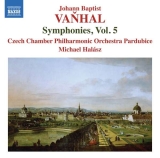Johann Baptist Vanhal, der aus einer böhmischen Familie niederländischer Herkunft stammte, lebte von 1739 bis 1813. Er entwickelte sich vom Violinisten zu einem begehrten Komponisten, der schließlich auch in Wien lebte und wirkte.
Die Gesamtaufnahme seiner Symphonien bei Naxos kommt nur langsam voran. 1998 begonnen, erreicht die Reihe jetzt Volume 5.
Michael Halasz hat drei Symphonien und ein Oboenkonzert aufs Programm gesetzt. Er arbeitet in seinen Interpretationen mehr heraus als nur packenden Melodien und mitreißende Rhythmen. Vanhal, der von Joseph Haydn ebenso beeinflusst wurde wie von Wolfgang Amadeus Mozart, mag zwar eine begnadete Eingebung für reizvollste Melodien gehabt haben und auch weniger tief in die Musik eingedrungen sein als diese beiden Confratres, aber in seinen Kompositionen gar nicht nach Stimmungen und Gefühlsausdruck zu suchen, hieße die Werke gehörig verstümmeln.
Es muss also positiv vermerkt werden, dass Halasz die Vortragsbezeichnungen gut differenziert und so ein nuancenreiches sensibles Spiel erreicht, das die Musik über die ihr manchmal nachgesagte oberflächliche Brillanz hinaushebt. Davon hätte ich mir trotzdem, vor allem in den schnellen Sätzen, etwas mehr gewünscht und auch mehr Spannung.
Johann Baptist Vanhal, who came from a Bohemian family of Dutch origin, lived from 1739 to 1813. He developed from a violinist into a sought-after composer who eventually also lived and worked in Vienna.
The complete recording of his symphonies on Naxos is making slow progress. Begun in 1998, the series has now reached Volume 5.
Michael Halasz has included three symphonies and an oboe concerto on the program. He brings out more in his interpretations than just gripping melodies and stirring rhythms. Vanhal, who was influenced by Joseph Haydn as well as by Wolfgang Amadeus Mozart, may have had a gifted intuition for the most delightful melodies and may also have penetrated less deeply into the music than these two confratres, but not to look for moods and emotional expression in his compositions at all would be to mutilate the works.
So, it’s very good that Halasz differentiates the music well, achieving nuanced sensitive playing that elevates the music beyond the superficial brilliance sometimes attributed to it. Still, I would have liked a bit more of that, especially in the fast movements, and also more tension.






















